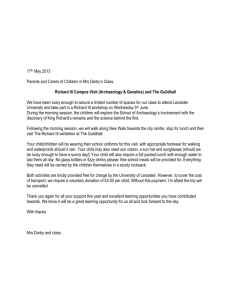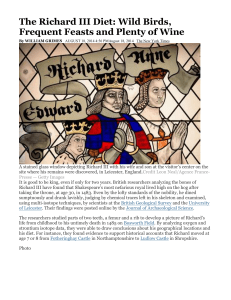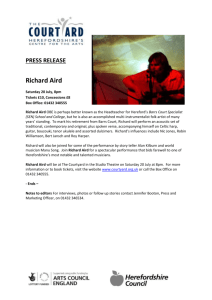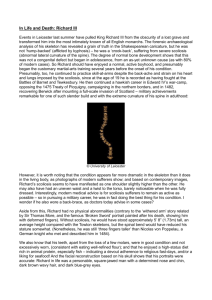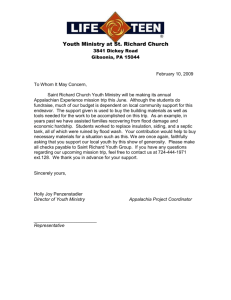Here`s - Indie Thinking
advertisement
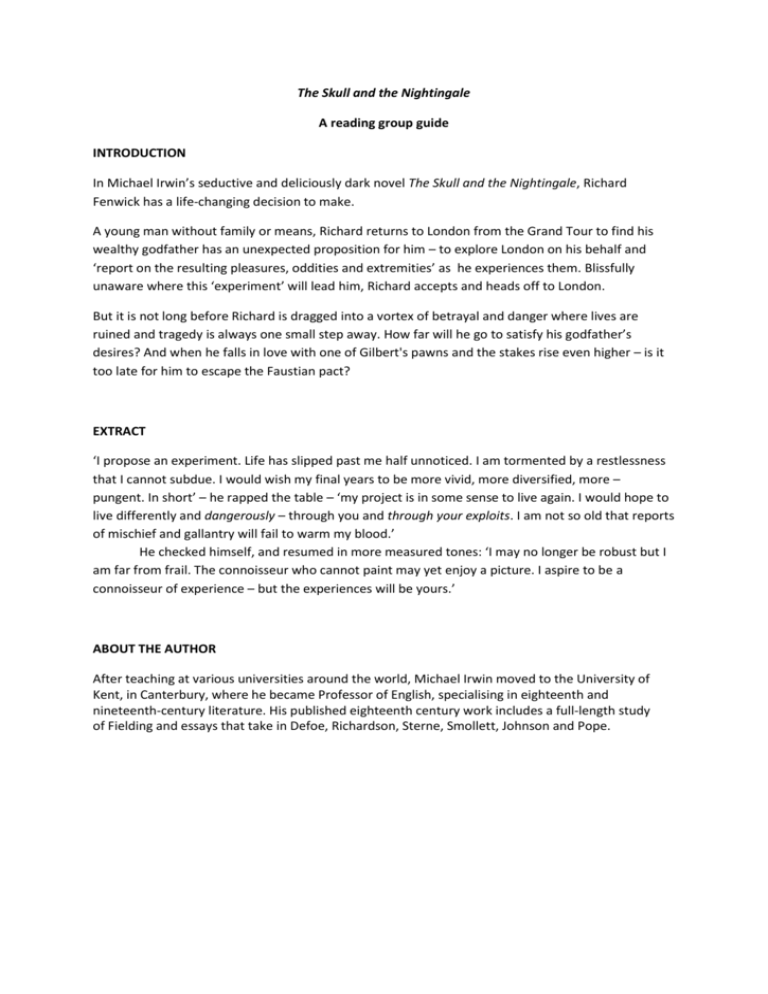
The Skull and the Nightingale A reading group guide INTRODUCTION In Michael Irwin’s seductive and deliciously dark novel The Skull and the Nightingale, Richard Fenwick has a life-changing decision to make. A young man without family or means, Richard returns to London from the Grand Tour to find his wealthy godfather has an unexpected proposition for him – to explore London on his behalf and ‘report on the resulting pleasures, oddities and extremities’ as he experiences them. Blissfully unaware where this ‘experiment’ will lead him, Richard accepts and heads off to London. But it is not long before Richard is dragged into a vortex of betrayal and danger where lives are ruined and tragedy is always one small step away. How far will he go to satisfy his godfather’s desires? And when he falls in love with one of Gilbert's pawns and the stakes rise even higher – is it too late for him to escape the Faustian pact? EXTRACT ‘I propose an experiment. Life has slipped past me half unnoticed. I am tormented by a restlessness that I cannot subdue. I would wish my final years to be more vivid, more diversified, more – pungent. In short’ – he rapped the table – ‘my project is in some sense to live again. I would hope to live differently and dangerously – through you and through your exploits. I am not so old that reports of mischief and gallantry will fail to warm my blood.’ He checked himself, and resumed in more measured tones: ‘I may no longer be robust but I am far from frail. The connoisseur who cannot paint may yet enjoy a picture. I aspire to be a connoisseur of experience – but the experiences will be yours.’ ABOUT THE AUTHOR After teaching at various universities around the world, Michael Irwin moved to the University of Kent, in Canterbury, where he became Professor of English, specialising in eighteenth and nineteenth-century literature. His published eighteenth century work includes a full-length study of Fielding and essays that take in Defoe, Richardson, Sterne, Smollett, Johnson and Pope. A CONVERSATION WITH THE AUTHOR 1. Your previous novel, Striker, was published in 1985. What prompted you to write The Skull and the Nightingale? Behind The Skull and the Nightingale lie years of teaching Eighteenth-Century Studies. I was intrigued by self-contradictions in the literature of the period so marked as to suggest the equivalent of a geological fault. Major writers, such as Pope, Swift, Fielding and Dr Johnson, were boldly assertive, confident in their common-sense and clarity of thought, yet were repeatedly brought up short by the corruption and ugliness of contemporary society. They wanted life to be meaningful and moral, but were haunted by fears that perhaps, after all, Man was no more than an animal. In Skull I try to dramatise the mental conflicts concerned. 2. What is the significance of the title? I don’t want to say too much here, because part of the point of the book is a gradual elucidation of its title. But as a start you can think of the Skull as standing for the physical human body and brain and the Nightingale as representing idealised love and beauty. 3. Before Richard moves to London, his godfather pays for him to go on ‘The Grand Tour’. Was this a typical activity for wealthy young men in the eighteenth century? The Grand Tour was frequently undertaken by the sons of the wealthy, partly as a rite of passage, partly to reinforce their classical education by showing them the roots of Western culture in terms of art and architecture. 4. What is Thomas Crocker’s role in the novel? Virtually all the characters in the book, even the minor ones, are shown to be trying to reconcile their aspirations with practical constraints, physical or financial. Crocker is an extreme case, in that he is particularly disadvantaged in physical terms yet has the wealth and the imagination to try to invent a life that will happily accommodate him. 5. On page 95, Gilbert claims, ‘I live in a great house defended by servants and dogs. The price I pay for my safety is imprisonment of a kind. I need a window in this confinement, a window in which to see a wider life.’ Do you think the reader should sympathise with Gilbert’s situation? Why, after all this time, is it so important for him to experience life? There could be a very long answer to these questions or a short one. Here’s a short one. We all aspire towards ‘a full life’. The individual who lives chiefly in the mind can be troubled by unappeased physical desires and curiosities. The converse is also true. A coalminer may take an Open University course or a priest drift towards a pole-dancing club. 6. London features heavily in the novel – why did you choose this setting for Richard to undertake his experiments? There was no other feasible setting. London was the great experiment of the age. In the middle of the eighteenth century over 600,000 people lived there – a tenth of England’s total population. In the country there was still the traditional social hierarchy and sense of order; in London people of every background were thrust promiscuously together. 7. On page 210, Gilbert notes, ‘It is the Passions that are of concern to me – Passions declared, suppressed, conflicting and compounded. These are the demons that determine our conduct.’ Why is he so obsessed with the ‘Passions’? Is this a typical concern of the period? Every age has its own quasi-scientific terms for describing the forces that shape the individual personality. Over the last century we’ve spoken airily of the inferiority complex, the Oedipus complex, id and ego, introvert and extrovert… In the eighteenth century there was comparable talk of ‘the Passions’ – Vanity, Ambition, Lust, Greed and so on. Some asserted that each of us is psychologically defined by a single characteristic of that kind: the Master Passion. Others took the view that several such passions might contend for the mastery. As in our own times, such diagnostic terminology could be used with serious explanatory intention, or could subside into conversational shorthand and approximation. 8. Are the characters based on anyone? Who do you most identify with? I’d have no interest in basing a character on a real-life person. For me the intriguing aspect of fiction is to invent and then see what strange thing one’s imagination has secretly been harbouring. Come to think of it, though, there’s one exception: years ago I saw a streetperformer go through the frog-swallowing routine, as described. If I identify with anyone it has to be Richard, because he’s the central consciousness, and the one who learns most. QUESTIONS FOR DISCUSSION 1. Discuss the relationship between Richard and Gilbert. How does it change throughout the novel? 2. On page 65, Richard states, ‘I must divert a man whose disposition I do not understand. I am locked into a strange game’. To what extent is it a “game”? Do you think Richard knows what he’s getting into? 3. What was your impression of the masquerade ball? 4. Discuss Richard’s treatment of women, paying particular attention to Sarah Ogden, Kitty Brindley and Mrs Hurlock. 5. Do you think Richard is entirely to blame for Mr Ogden’s death? 6. Towards the end of the novel, Richard states: ‘Am I to be allowed no life of my own? Am I to be my godfather’s performing dog?’ Do you sympathise with Richard? How much responsibility should he take for the misery he is now feeling? 7. Were you surprised by the ending of the novel? What did you think of Richard’s decision? 8. Did the book make you want to find out more about eighteenth-century London? Would you recommend it?

